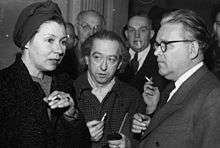Veit Harlan
| Veit Harlan | |
|---|---|
 Harlan (right) with the widow of Ferdinand Marian, at Harlan's court case in 1948 | |
| Born |
22 September 1899 Berlin, German Empire |
| Died |
13 April 1964 (aged 64) Capri, Italy |
| Nationality | German |
Veit Harlan (22 September 1899 – 13 April 1964) was a German film director and actor.
Life and career
Harlan was born in Berlin. After studying under Max Reinhardt, he first appeared on the stage in 1915 and, after World War I, worked in the Berlin stage. In 1922 he married Jewish actress and cabaret singer Dora Gerson; the couple divorced in 1924. Gerson later died at Auschwitz with her family. In 1929, he married Hilde Körber, having three children with her before divorcing her for political reasons related to the influence of National Socialism. One of their children, Thomas Harlan, became a writer and director in his own right. Afterwards, he married the Swedish actress Kristina Söderbaum, for whom he wrote several tragic roles which included some very dramatic suicide scenes, further increasing their popularity with the German cinema audience.
Nazi era
Film critic David Thomson asserts that Harlan, having just started directing in 1935, was only able to attract Goebbels' attention because so much directorial talent had emigrated from Germany after the Nazis had taken power.[1] By 1937, Joseph Goebbels had appointed Harlan as one of his leading propaganda directors. His most notorious film was Jud Süß (1940), which was made for anti-Semitic propaganda purposes in Germany and Austria. In 1943 it received UFA's highest awards. Karsten Witte, the film critic, provided a fitting appellation for Harlan calling him "the baroque fascist". Harlan made the Reich's loudest, most colorful and expensive films.[2]
Postwar
After the war Harlan was charged with participating in the anti-Semitic movement and aiding the Nazis. But he successfully defended himself by arguing that the Nazis controlled his work and that he should not be held personally responsible for its content. In 1949, Harlan was charged with crimes against humanity for his role as director of Jud Süß. The Hamburg Criminal Chamber of the Regional Court (Schwurgericht) acquitted Harlan of the charges; however, the court of the British occupation zone nullified the acquittal.[3]
In 1951, Harlan sued for an injunction against Hamburg politician Erich Lüth for publicly calling for a boycott of Unsterbliche Geliebte (Immortal Beloved). The District Court in Hamburg granted Harlan's suit and ordered that Lüth forbear from making such public appeals. However, the lower court decision was ultimately overturned in 1958 by the Federal Constitutional Court because it infringed on Lüth's right to freedom of expression. This was a landmark decision because it clarified the importance of the constitutional civil rights in disputes between individuals.
Harlan made a total of nine films between 1950 and 1958, dying in 1964 while on vacation in Capri.[4]
Family
Veit Harlan's son Thomas (1929-2010), an author and film director, created a semi-documentary film called Wundkanal (Wound Passage), in which his father, played by a convicted mass murderer, is forced to undergo a series of brutal interrogations into his war crimes.[5] Thomas Harlan's final publication, issued posthumously, Veit, was a memoir in the form of a letter to his father, continuing the investigation into Veit Harlan's complicity in the Nazi regime.[6]
In 1958, Veit Harlan's niece, Christiane Susanne Harlan, married filmmaker Stanley Kubrick, who was Jewish. She is credited by her stage name "Susanne Christian" in Kubrick's Paths of Glory (1957). They remained married until Stanley Kubrick's death in 1999.
Susanne Körber, one of his daughters from his second wife Hilde Körber, converted to Judaism and married the son of Holocaust victims.[7] She committed suicide in 1989.[7]
Documentaries
In 2001, Horst Königstein made a film titled Jud Suss - Ein Film als Verbrechen? (Jud Suss - A Film As a Crime?).
The documentary Harlan – In the Shadow of Jew Süss (2008) by Felix Moeller explores Harlan's motivations and the post-war reaction of his children and grandchildren to his notoriety.[7]
Selected filmography
- The Master of Nuremberg (1927)
- The Trousers (1927)
- Somnambul (1929)
- Revolt in the Reformatory (1929)
- The Eleven Schill Officers (1932, actor)
- Typhoon (1933)
- Paganini (1934)
- A Woman With Power of Attorney (1934)
- Don't Lose Heart, Suzanne! (1935)
- Trouble Backstairs (1935)
- Fräulein Veronika (1936)
- Maria the Maid (1936)
- Kreutzersonate (1937)
- Der Herrscher (1937)
- Jugend (1938)
- Covered Tracks (1938)
- Das unsterbliche Herz (1939)
- The Journey to Tilsit (1939)
- Jud Süß (1940)
- Der große König (1941)
- Pedro Will Hang (1941)
- Die goldene Stadt (1942)
- Immensee (1943)
- Opfergang (1944)
- Kolberg (1944/1945)
- Immortal Beloved (1950)
- Hanna Amon (1951)
- Die blaue Stunde (1952)
- Stars Over Colombo (1953)
- Verrat an Deutschland (Der Fall Dr. Sorge) (1954)
- Anders als du und ich aka Das dritte Geschlecht (1957)
See also
Further reading
Veit Harlan: The Life and Work of a Nazi Filmmaker by Frank Noack, 2016, University Press of Kentucky.
References
- ↑ David Thomson The New Biographical Dictionary of Film, London: Little, Brown, 2002, p.372
- ↑ Eric Rentschler "The Ministry of Illusion", p. 167. ISBN 0-674-57640-3
- ↑ Cremer, Hans-Joachim (2010-10-11). Human rights and the protection of privacy in tort law: a comparison between English and German law. Taylor & Francis US. p. 174. ISBN 978-0-415-47704-8.
- ↑ Georges Sadoul; Peter Morris (1 September 1972). Dictionary of films. University of California Press. p. 170. ISBN 978-0-520-02152-5. Retrieved 5 November 2011.
- ↑ Kaes, Anton (1992). From Hitler to Heimat: The Return of History as Film. Harvard University Press. p. 141. ISBN 0674324560.
- ↑ Verger, Romain. "Thomas Harlan, Veit. Lettre au père ou l'insoutenable légèreté". Anagnostes. Retrieved 2 March 2015.
- 1 2 3 Rohter, Larry (March 2, 2010) "Nazi Films Still Pains Relatives". New York Times, Retrieved on March 2, 2010